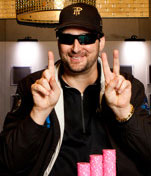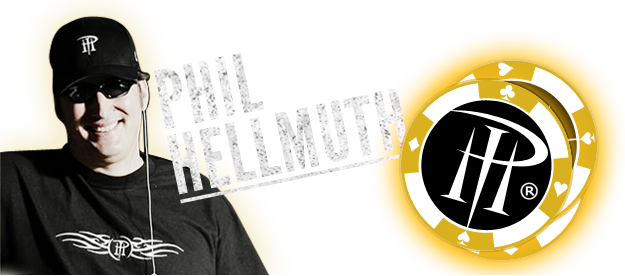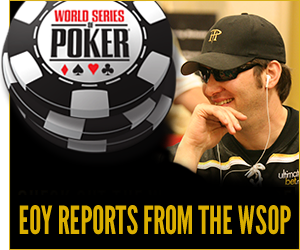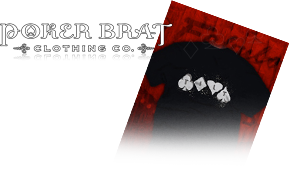-
The 11th Bracelet – So Close
Just before writing this, I played for 21 hours straight in the last World Series of Poker (WSOP) event of 2006. We began the one-day event with more than 400 players at 10 a.m. on Wednesday, and it is now — as I write this — 7:40 a.m. on Thursday. I had a fantastic chance to shock the poker world and win my 11th WSOP bracelet — which would have given me the record for the most bracelets (Johnny Chan and Doyle Brunson also have 10). With the spotlight on the final day of the main event today at 2 p.m., and the $12 million first place prize, I would have loved to steal a little bit of that thunder!
Alas, I finished in third place, but still, it was record-setting performance that I’m proud of. It was my eighth time in the money at the 2006 WSOP, and that feat has only been done two other times (Marco Traniello last year, and Richard Tatalovich this year). It was my 57th all-time cash in WSOP history, which is a record. It gave me a first, a second, a third, and a sixth; for four final tables in total.
Still, at this moment, I’m feeling like I left a bracelet or two on the table. It is my time in the poker world, and I only picked up one bracelet, and finished second in the all-around points race. How often will it be my time at the WSOP?
My mistake today was that I didn’t play aggressively enough. Too often, I felt like my opponent was weak when he raised it up, and I didn’t do anything about it. I should have pounced on that weakness. Had I made some moves, then every time I was right I would pick up a bunch of chips. Every time I was wrong, I would lose a bunch of chips, but at least I would trust my instincts!Instead of using my powers of observation (reading people) I waited around, and made almost no moves for five hours. On the other hand, I could have been lucky enough to win more pots along the way. Still, that “free money” that you win when you reraise your opponent (and he folds) can be the difference between winning and losing.
A couple of times I was ready to make a reraise, but Lee Watkinson, who was sitting on my right, beat me to the punch (he reraised before I had the chance to). Maureen Feduniak and one young European were left fighting for the bracelet when I left. The European made several moves at me, but I couldn’t catch him with the right hand at the right time; too bad. One hand, with the blinds at $4,000-$8,000, I called in the small blind with K-8, and he moved all-in for $100,000 more. The very next round, I called in the small blind, and he moved all-in again. The very next round, I called and he moved all-in again! This last time, I had $59,000 left, and the Qc-10c. I pondered for awhile, but thought that I would find a better spot to put in my last $59,000. Even looking back now, I feel; like it was the right fold. However, rather than call his bet, I could have moved all-in on him with the Qc-10c!
I was waiting for a better spot, and it came up the very next hand. Feduniak called in the small blind, and I checked with my 4-3. The flop was A-7-6, and we both checked. I thought, “Wow, let me get lucky and hit a five here to make a straight.” The next card was a five, Feduniak checked, and I bet $9,000 into the $19,000 pot. She called, and the last card was a queen. Feduniak bet out $10,000, and I moved all-in for my last $40,000 in total, raising it $30,000 more. Feduniak called instantly, and showed me a higher straight (she had 9-8 in her hand). Ouch! I was out of the tournament, and my wife, who sat by me with no sleep until 7 a.m., had the pleasure of hearing me whine for the next 30 minutes. So much history hanging in the balance, so close, so close, and yet so far — now I have to wait until 2007.
Later today, Allen Cunningham has a good chance to do what no other pro has been able to do since the year 2001. He has a chance to win the main event of the WSOP, and the accompanying $12 million first-place prize, despite a starting field of 9,000 players. With nine players remaining, Jamie Gold (another great last name like the 2003 champion Chris Moneymaker) has more than $30 million in chips, but Cunningham has roughly $18 million in chips. Check out the final results at CardPlayer.com.
Not playing aggressively can be:
A) good most times
B) bad all of the time
C) great if you have bad instincts
D) all of the aboveAnswer: B
Related Posts
- The Holiday Game
- Poker for Police Officers
- No ‘Blow-Up’ for Matusow
- Furst Versus Worst
- Cunningham Going for the Gold
- Winning from the Hole
- After-Hours Poker
- Key Hand at European Poker Championships
- Make the Most of It!
- One Tough Poker Game
Recent Posts
- WSOPE 2nd place finish
- Update from this years WSOP 2019
- Happy Holidays! Updated stock at Poker Brat, new book!
- Phil Hellmuth wins historic 15th World Championship!
- Final golden ticket winner coming soon
- Poker Brat – The Phil Hellmuth Jr. Autobiography
- Phil Hellmuth’s “Pokerbrat” – Coming soon to audio book!
- Poker Night in America – Sugar House Casino
- Sugar House w Matt Glantz
- Lost and found

 ™
™








